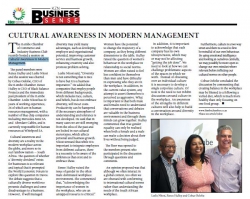Cobus Oelofse - Cultural Awareness in Modern Management2016-12-02 The iLembe Chamber of Commerce and Industry Business Club recently hosted a session on Cultural Awareness in Modern Management.
The panel members were Renee Hulley and Leslie Nkosi and the session was chaired by Cobus Oelofse, CEO of the iLembe Chamber. Renee Hulley is CEO of Black Balance Projects and the immediate past president of the iLembe Chamber. Leslie Nkosi has 32 years of working experience, 26 of which are in human resources management, with a number of blue chip companies including Mercedes-Benz SA and Aberdare Cables, and is currently responsible for human resources at Whirlpool SA. Cultural awareness and diversity are a reality in the modern workplace across the globe, and more so in our rainbow nation - South Africa. The question of whether a ‘diversity dividend’ exists for businesses is so relevant and topical that it prompted the World Economic Forum to explore this question in Davos. The debate suggests that a culturally diverse workforce presents challenges and some disadvantages to a business. However, if well managed diversity may yield many advantages, such as developing employee and organisational potential, improving customer service and business growth, enhancing creativity and also promote problem solving. Leslie Nkosi said, “Diversity is not something that is nice to have but it is a business imperative.†He added that companies that employ people from different backgrounds, which includes race, culture, and beliefs, but do not embrace diversity, will incur costs. Productivity can be hampered if the necessary atmosphere of understanding and tolerance is not developed. He said that in many cases we are still emerging from the silos of the past and are locked in our cultural stereotypes, which affects personal and business growth. Nkosi stressed that while it is important to integrate employees from different cultures, there is a necessity to be aware of the differences that exist and to embrace these. Renee Hulley raised the issue of gender in the often male dominated workplace environment. She commented that, “Acknowledging the importance of women in the workplace, who are an untapped resource is critical.†Women have the potential to change the trajectory of a company, as they bring different dimensions to the table. Hulley raised the question of women’s behaviour in the workplace in relationship to social norms. Women are often raised to feel less confident in themselves than men and have difficulty in expressing who they are in the workplace. In addition, in the current value system, any attempt to assert themselves is perceived as aggressive. What is important is that both male and females need to understand that conversations and debates are valuable in the business environment and through them minds can grow together. Hulley commented that true gender equality can only be realised when both a female and a male can make a decision about their lives without being judged. The floor was opened to the members present who participated in the discussion through questions and comments. An opinion proposed was that although we often interact in a global context, too often we are obsessed with conforming to international cultural norms rather than understanding the needs of the South African workplace. In addition, it is important to acknowledge that each company has its own idiosyncrasies, which may or may not be affecting “getting the job doneâ€. We need to look at how we can challenge problematic aspects of the spaces in which we work. Instead of obsessing over an individual culture it is necessary to develop a single corporate culture. Of note is the need to not inhibit discussions around culture in the workplace. An awareness of the strengths in different cultures will also help to build a conversation around diversity in the workplace. Furthermore, culture is a two way street and there is a need to first be mindful of our own behaviour. By using emotional intelligence and looking at ourselves carefully, we may possibly be more open to change our own mindset where relevant before inflicting our cultural norms on other people. Cobus Oelofse concluded the discussion by commenting that creating balance in the workplace may be likened to a following a varied diet, which is much more healthy than only focusing on one food group. ï® www.ilembechamber.co.za |
Cobus Oelofse - Cultural Awareness in Modern Management
Copyright © 2024 KwaZulu-Natal Top Business
